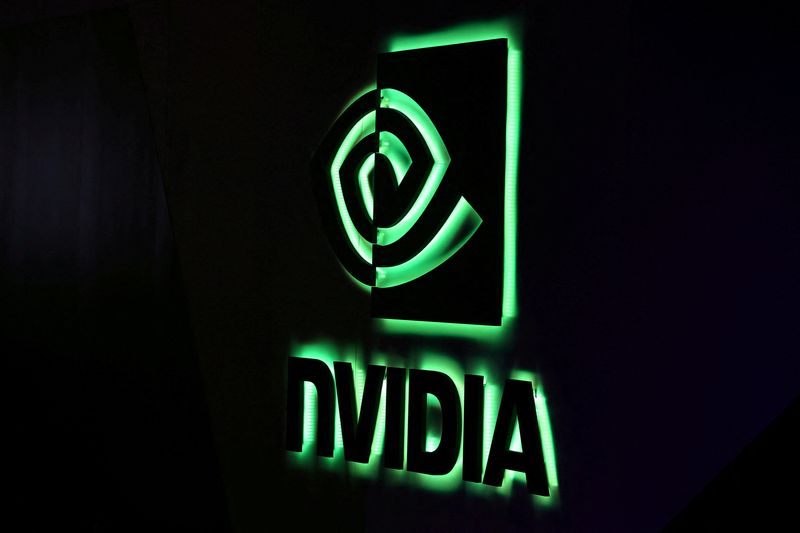By Fanny Potkin and Heekyong Yang
SINGAPORE/SEOUL (Reuters) -A version of Samsung Electronics (KS:005930)' fifth-generation high bandwidth memory (HBM) chips, or HBM3E, has passed Nvidia (NASDAQ:NVDA)'s tests for use in its artificial intelligence (AI) processors, three sources briefed on the results said.
The qualification clears a major hurdle for the world's biggest memory chipmaker which has been struggling to catch up with local rival SK Hynix in the race to supply the advanced memory chips capable of handling generative AI work.
Samsung and Nvidia have yet to sign a supply deal for the approved eight-layer HBM3E chips but will do so soon, the sources said, adding that they expect supplies would start by the fourth quarter of 2024.
The South Korean technology giant's 12-layer version of HBM3E chips, however, has yet to pass Nvidia's tests, the sources said, declining to be identified as the matter remains confidential.
Nvidia declined to comment.
In a statement to Reuters, Samsung said that the testing of its products was proceeding as planned, adding that it was "in the process of optimising its products through collaboration with various customers." It did not elaborate further.
HBM is a type of dynamic random access memory or DRAM standard first produced in 2013 in which chips are vertically stacked to save space and reduce power consumption. A key component of graphics processing units (GPUs) for AI, it helps process massive amounts of data produced by complex applications.
Samsung has been seeking to pass Nvidia's tests for HBM3E and preceding fourth-generation HBM3 models since last year but has struggled due to heat and power consumption issues, Reuters reported in May, citing sources.
The company has since reworked its HBM3E design to address those issues, according to the sources who were briefed on the matter.
Samsung said after the publication of the Reuters article in May that claims its chips had failed Nvidia's tests due to heat and power consumption problems were untrue.
"Samsung is still playing catch up in HBM," said Dylan Patel, founder of semiconductor research group SemiAnalysis.
"While they (will) begin shipping 8-layer HBM3E in Q4, their rival SK Hynix is racing forward shipping (their) 12-layer HBM3E at the same time."
Shares in Samsung Elec closed up 3.0% on Wednesday, beating a 1.8% rise in the broader market. SK Hynix closed up 3.4%.
The latest test approval follows Nvidia's recent certification of Samsung's HBM3 chips for use in less sophisticated processors developed for the Chinese market, which Reuters reported last month.
Nvidia's approval of Samsung's latest HBM chips comes amid soaring demand for sophisticated GPUs created by the generative AI boom that Nvidia and other makers of AI chipsets are struggling to meet.
HBM3E chips are likely to become the mainstream HBM product in the market this year with shipments concentrated in the second half, according to research firm TrendForce. SK Hynix, the leading manufacturer, estimates demand for HBM memory chips in general could increase at an annual rate of 82% through 2027.
Samsung forecast in July that HBM3E chips would make up 60% of its HBM chip sales by the fourth-quarter, a target that many analysts say could be achieved if its latest HBM chips passed Nvidia's final approval by the third quarter.
Samsung does not provide revenue breakdowns for specific chip products. Samsung's total DRAM chip revenue was estimated at 22.5 trillion won ($16.4 billion) for the first six months of this year, according to a Reuters' survey of 15 analysts, and some said about 10% of that could be from HBM sales.
There are only three main manufacturers of HBM - SK Hynix, Micron (NASDAQ:MU) and Samsung.
SK Hynix has been the main supplier of HBM chips to Nvidia and supplied HBM3E chips in late March to a customer it declined to identify. Shipments went to Nvidia, sources had said earlier.

Micron has also said it will supply Nvidia with HBM3E chips.
($1 = 1,375.6400 won)